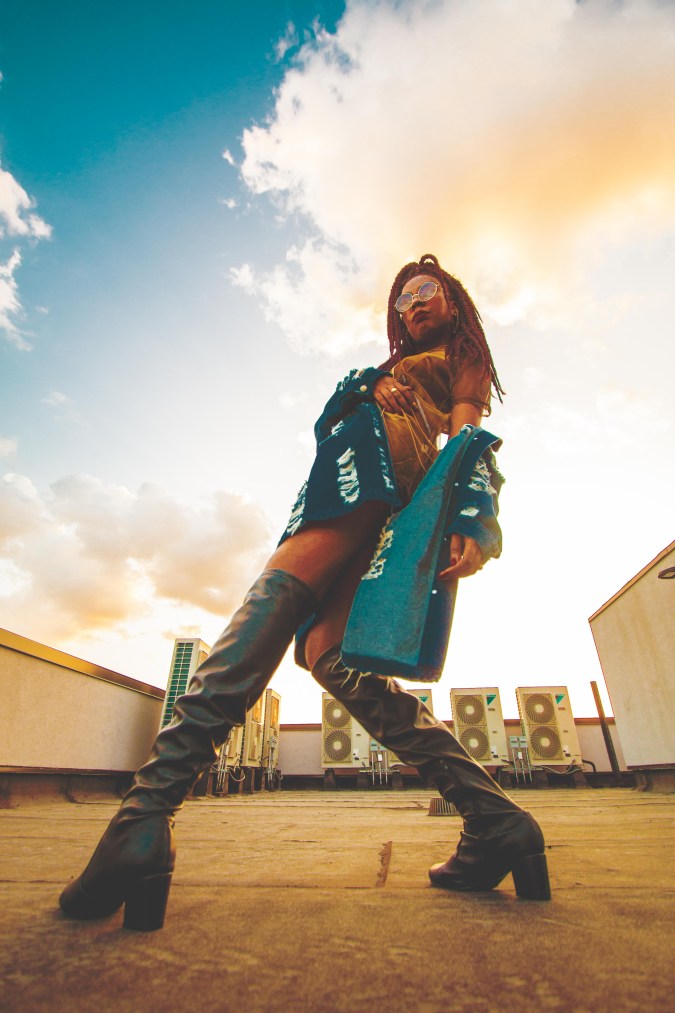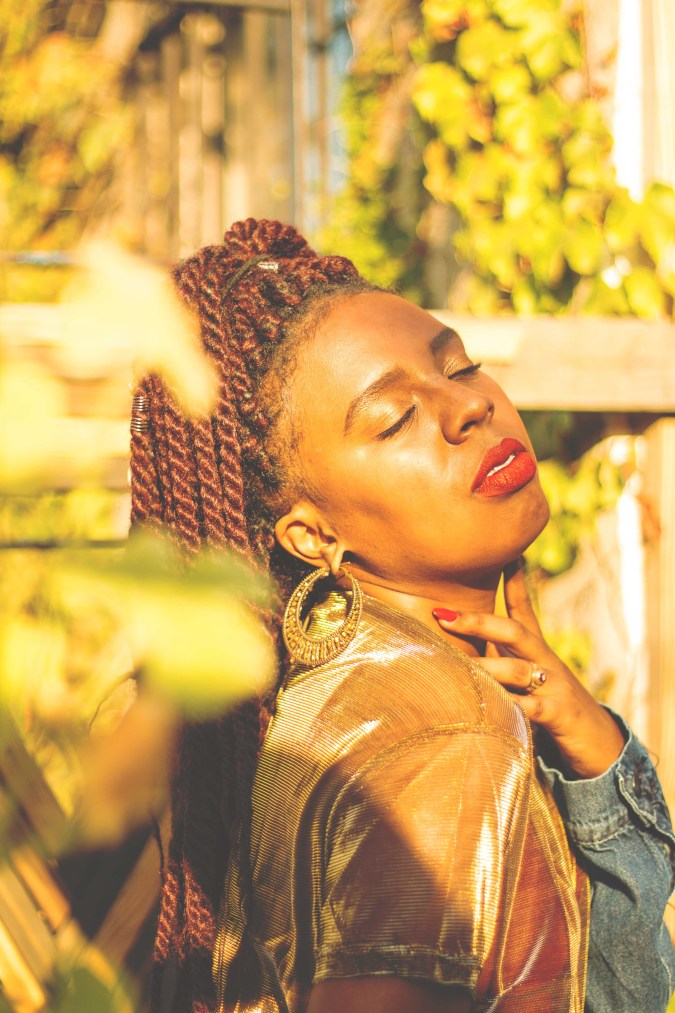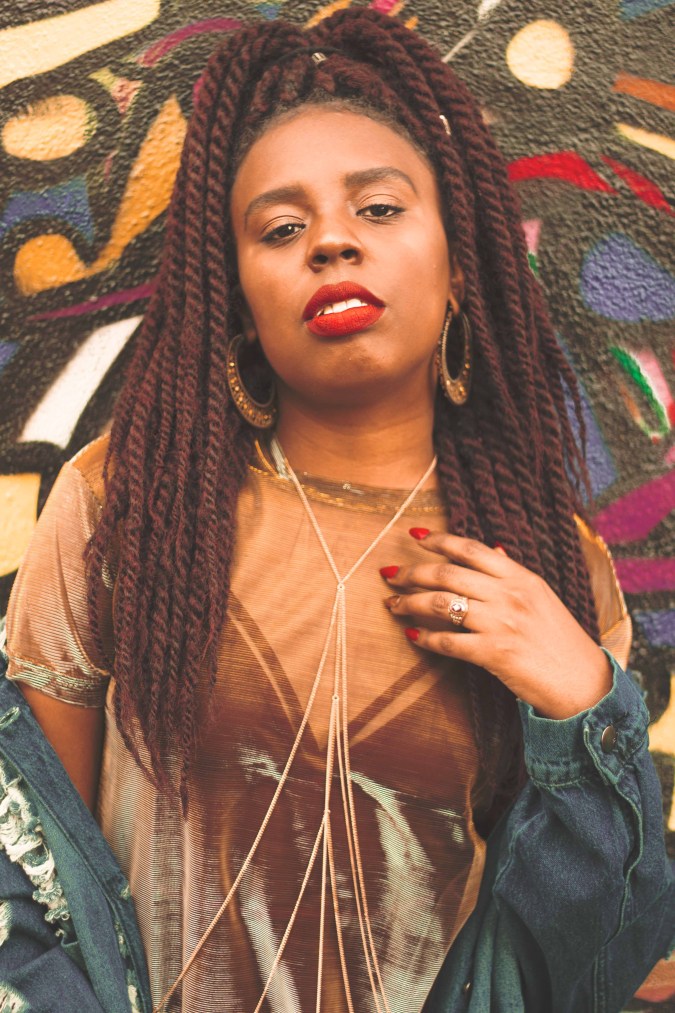The delicate piano keys, guitar riffs, and harp runs of Jennifer Lopez’s “I’m Glad” swirl in a cafe in Brooklyn on a cloudy August afternoon. Beside me in maroon box braids sits DJ Bembona, a 26-year-old New York native known for spinning Afro-diasporic tracks to perrear to. Her glossy lips, which match the hues of her hair, twist into a smile when I tell her that her sets, conscious y bien brutal, make the protest the turn-up spot. “I just never thought I’d be here. I’m so bendecida,” she tells me between youthful giggles, appearing almost as happy as Ben Affleck made J.Lo in the 2002 hit still playing in the background.

Around the time that song was bumping on the radio, Bembona, born Xiomara Marie Henry, was 11 years old. Her Puerto Rican-Panamanian household in Brooklyn’s Fort Greene neighborhood throbbed with salsa, merengue, and Motown soundtracks. Calling Bori giant El Gran Combo her favorite band ever, she grew up dancing to classic Caribbean rhythms at family house parties from Brooklyn to the South Bronx. But when she returned home and put on her headphones to her portable CD player, she bopped to the pop hits of the late 90s and early millennium: Britney Spears,*NSYNC, the Spice Girls. Along with the bubblegum pop records came popularly-held beliefs that European features like light skin and straight hair were ideal, and black Latinas like her needed to marry white to mejorar la raza. “I really didn’t think there was a problem with these things,” Bembona says in a black V-neck shirt and leggings, later quipping that she was not “woke” just a few years ago.
“I just want to make people feel like they belong, and they’re safe.”
Bembona’s journey of decolonized self-love kicked off three years ago, right when she began spinning. What started as a way to listen to songs she wanted to hear while entertaining friends at college house parties turned into a story of self-affirmation. She was playing tracks that represented the multidimensionality of first-generation Latinas in New York, blending Spanish-language salsa, reggaeton, and merengue bangers with English-language R&B and hip-hop chart-toppers. Then it hit her: “It’s all African music. The rhythms derive from Africa,” she says. “It makes me move and feel and gets me in tune with myself, my spirituality, my ancestors. It goes beyond playing a song.” On the dance floor, the crowd typically had a similarly transcendent experience. Her parties began to attract a community of black and brown activists, brujxs, and artists who taught her about Afro-Latinidad, allowing her to see herself as fully Latina and black for the first time in her life. In the process, a fighter for black and brown joy and liberation was born.

For Bembona, DJing is a form of cultural activism. “It started for fun, but it became more important. It became a strong connection to my culture, my bond, and what I wanted to do for the people,” she tells me. She premiered her debut mixtape La Sala right here at Remezcla, and the artist frequently lends her talents to social justice events and programs throughout the city. Last year, she teamed up with Mi Casa No Es Su Casa, a collective of native New York artists and activists shedding light on the dangers of gentrification in Bushwick, Brooklyn, to produce an anti-displacement mixtape. Thinking of the people who call the neighborhood home – undocumented immigrants, first- and -second generation brown kids – she collided underground hip-hop, cumbia, and indigenous rhythms to create a compilation that would resonate with the community. “This is fo’ my barrio, this is fo’ my ghetto/Aquellos que nunca se conforman, si no llegan de primero,” rap Los Rakas in “Mi Barrio,” a song she added to the mixtape. Also included is Ana Tijoux’s “Somos Sur,” a track about global resistance against violence and colonialism. “Gentrification is a big one for me,” Bembona says, right before a white mother runs over to us to stop her baby from pulling on the chair I’m sitting on, without apologizing. “I grew up here, and look at it. I can’t not be a part of this.”

“Music is the healer and the mover.”
For her, DJing is always for the culture. She’s performed in Colombia, spun at Afro-Latino Festival twice, opened for Bomba Estéreo on their recent tour stop in New York, and made her mami and papi the proudest parents in the borough when she produced mixtapes for the legendary salsa label Fania Records. She’s also one-third of Loca Vibes Radio, a two-hour independent guerrilla radio show aired through Radio Free Brooklyn offering Latinx news, political, and social analysis in Spanglish as well as afro-indígena tunes every Thursday.

She even throws Vibras NYC, a monthly pari for first- and -second generation black and brown folks. In August, the theme was Issa Fête, and Bembona, dressed in yellow-feathered wings and a headdress in different shades of orange, spun everything from dancehall, soca, and calypso to dembow, baile funk, and merengue and even Beyoncé’s unforgettable Spanish version of “Irreplaceable.” It’s the kind of bash where blackness is celebrated and queer and trans people are affirmed, even as Zion y Lennox blast in the background. “I just want to make people feel like they belong, and they’re safe and they could just do whatever and be whoever,” she says. For club kids, and even for Bembona, the music she plays is also healing. “Anxiety is huge in our community, and everything that’s going on in this trumpocalypse, it means a lot for me that I can ease somebody for at least a few minutes, because I know it’s temporary,” she adds.
As she plans for the future of her booming career – international tours, producing music, launching an artistic house – Bembona’s goal is to always spin curative sounds that empower the marginalized and push movements forward. To her, “music is the healer and the mover.”

Stream an exclusive playlist via Apple Music from DJ Bembona below. Of the playlist, Bembona says, “the theme of the playlist is mainly powerful tunes that can aid us in our journey of self-discovery, of social justice, of embracing our power (as latinx/black/brown/womyn).”




